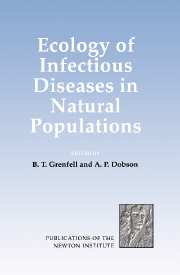Book contents
- Frontmatter
- Contents
- List of Participants
- Introduction
- BROAD PATTERNS AND PROCESSES
- PATHOGENS, INSECTS AND PLANTS
- IMPACT OF ECOLOGICAL AND GENETIC HETEROGENEITY
- Environmental Influences on Host Immunity
- Modelling the Immuno-Epidemiology of Macroparasites in Wildlife Host Populations
- Spatial Dynamics of Parasitism
- Spatial Dynamics Group Report
- Genetic Diversity in Host-Parasite Interactions
- Genetics and Evolution of Infectious Diseases in Natural Populations Group Report
- Beyond Host-Pathogen Dynamics
- Glossary
Beyond Host-Pathogen Dynamics
Published online by Cambridge University Press: 22 January 2010
- Frontmatter
- Contents
- List of Participants
- Introduction
- BROAD PATTERNS AND PROCESSES
- PATHOGENS, INSECTS AND PLANTS
- IMPACT OF ECOLOGICAL AND GENETIC HETEROGENEITY
- Environmental Influences on Host Immunity
- Modelling the Immuno-Epidemiology of Macroparasites in Wildlife Host Populations
- Spatial Dynamics of Parasitism
- Spatial Dynamics Group Report
- Genetic Diversity in Host-Parasite Interactions
- Genetics and Evolution of Infectious Diseases in Natural Populations Group Report
- Beyond Host-Pathogen Dynamics
- Glossary
Summary
Introduction
Historically, both empirical and theoretical population ecology have largely been preoccupied with one- and two-species systems. There are two very good reasons for this. The first is the sheer difficulty of extending studies to even three species both from the point of view of the analysis of models, and perhaps even more from the point of view of collecting dynamical data from multi-species systems. The second is that despite the obvious fact that no population exists in isolation, or interacts with only one other species, there are many contexts in which interaction strengths are such that two-species systems, at least, are an acceptable approximation to the truth. Nonetheless, and more specifically, there is strong motivation for extending the study of host-pathogen dynamics to that of multi- (that is, more than two species) interactions, in that there are contexts in which it is necessary to do so that may be fundamental (the role of pathogens, and indeed population dynamics, in community structure) or applied (elaborated on below).
Here we look beyond host-pathogen dynamics. We focus on ‘ecological’ systems, where host density is itself a dynamical variable, because the questions that have motivated us relate to host dynamics rather than the changing balance between diseased and healthy individuals in a host population of unchanging size. We refer, though, to a limited amount of epidemiological work where this demonstrably throws light on the systems on which we concentrate.
- Type
- Chapter
- Information
- Ecology of Infectious Diseases in Natural Populations , pp. 478 - 509Publisher: Cambridge University PressPrint publication year: 1995
- 24
- Cited by



